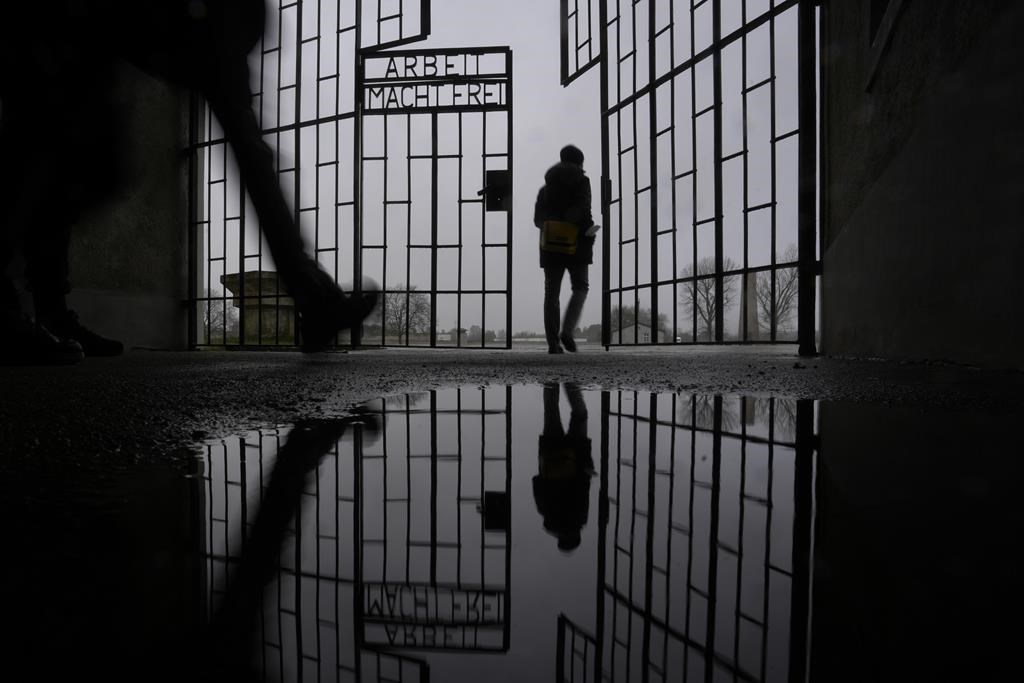Woman hidden from Nazis appeals for Palestinian children on Holocaust Remembrance Day

Suzanne Weiss has been thinking about the young children orphaned in Gaza.
The 83-year-old Toronto resident clearly recalls the terror she felt as a young girl, when she was hidden from Nazis by a Jewish resistance group in rural France during the Second World War.
Her mother had sent her into the care of others and died at the Auschwitz concentration camp when Weiss was three years old.
Advertisement
“We remember how we were when we were children … so I can relate with the children even though I’m 83 now,” Weiss said in an interview with The Canadian Press.
“The children in Palestine that are suffering are losing their childhood … Most of them are losing their families, losing their friends.”
As the world marks International Holocaust Remembrance Day on Saturday, Weiss says the current Israel-Hamas war has her thinking about the lasting effects of trauma, particularly on children.
“A lot of children died during the Holocaust. I almost lost my life. The trauma is unspeakable. It’s unimaginable,” she said.
International Holocaust Remembrance Day marks the anniversary of the liberation of Auschwitz-Birkenau, the most notorious Nazi extermination camp.
Advertisement
The Nazis murdered six million Jews in Europe during the Second World War. Israel, founded in 1948, rose in the aftermath of that genocide.
On a day when Weiss thinks of the collective forces that saved her and countless others, she said it is important for the world to learn from the past.
“It was the solidarity of many individuals and a whole community who believed in humanity that saved me,” she said.
Weiss, who was born in Paris, said she spent five years at a Jewish orphanage after the Second World War and was adopted at the age of nine by a Jewish family in New York. She later came to Canada with her husband in the 1980s.
“We were taught in the orphanages that now the war is over, we should look forward to the future. We should all be conscious of love, brotherhood, sisterhood and that what we want to do is live in peace and equality,” she said.
Advertisement
“That’s the way the world should live. That’s what we should strive for.”
The Health Ministry in Gaza has said more than 25,700 people have been killed and another 63,000 wounded in the Palestinian enclave since the Israel-Hamas war began on Oct. 7, when Hamas militants from Gaza killed around 1,200 people in an incursion into southern Israel and took about 250 hostages, including children.
Weiss said she would like the fighting to stop and for aid to easily get to Gaza’s residents. She is also a supporter of the BDS movement, which calls for boycotts and sanctions against Israel.
She is also hopeful that the flood of information on the war – through live feeds, social media and constant news updates – will increase awareness of the intense suffering wrought by war.
Tova Clark, who was a year old when her family fled Nazi Germany, has been watching the developments in Israel and Gaza closely.
Advertisement
The Ottawa resident said her family ended up in Shanghai after being rejected by multiple countries as Jewish refugees. They later moved to Israel, where Clark lived from the age of nine to 21. After completing her military service, she met her husband – a Canadian – and then spent decades as a diplomat’s wife, living in countries around the world.
When she talks about the Hamas attacks on Oct. 7, she links it to the experience of Jewish people in prewar Germany.
“They couldn’t imagine what would happen. It was beyond human imagination. That’s why what happened on Oct. 7 penetrated,” she said. “But it’s such a human tragedy, what happened, on both sides.”
She says she is still watching the news, even if it sometimes gets to be too much and she has to turn it off.
“You can’t not be involved, you know? But with my experience, having lived in so many different countries, I’ve widened my horizons, and I can understand the suffering of the other side,” she said.
Advertisement
The complexity of the situation isn’t always fully represented, she said, and people tend to simplify the issues.
Hamas has vowed to annihilate Israel and has been responsible for many suicide bombings and other deadly attacks on civilians and Israeli soldiers.
Clark said she doesn’t believe “for one minute” that that group, which took control of Gaza in 2007, represents all Palestinians.
She also said she believed that if there was another way to defeat Hamas, “I think Israel would do it.”
The situation has now hardened the positions of people on both sides, Clark said.
Advertisement
“Multiculturalism in Canada has been manifest for many years. I think it’s a wonderful, wonderful thing and maybe that’s eroding now,” she said.
Clark said she’s been told she should remove the menorah in her living room window. “I said no, that’s my act of defiance.”
Ultimately, she said, a Palestinian state is “very desirable” but the question is whether it is feasible.
“There are two sides and they’re both right. So how do you solve that,” she said.
“Israel has a history, the Jewish people, the Holocaust, Zionism, the fledgling nation, how they had to fight for everything. So they’re right, in the Jewish people wanting their own state,” Clark said.
Advertisement
“And so are the Palestinians. They also want their own state … I understand that completely, and many people in Israel understand that.”
This report by The Canadian Press was first published Jan. 26, 2024.
Fakiha Baig and Anja Karadeglija, The Canadian Press